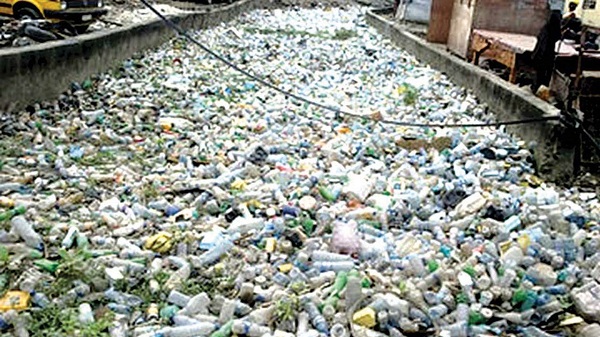
Plastic pollution has become one of the gravest environmental problems confronting the global community with impacts transcending national, regional and international boundaries. The magnitude of the problem is reflected in the fact that each year about eight million tonnes of plastic toxic wastes end up in our oceans and if this trend continues, it is projected that there would be more plastics than fish in our oceans.
Nigeria, with a population of about 200 million people generates about 1.5 million tonnes of plastic wastes every year of which less than 10 per cent is recycled. The problem of plastics pollution in the country is exacerbated by inadequate waste management infrastructure, poor behavioural attitude, unskilled waste collection workforce, indiscriminate dumping and burning of plastic wastes, poor awareness, inadequate funding etc.
To tackle this menace the Federal Government unveiled a report, funded by the Japanese government and implemented by the United Nations Industrial Development Organization (UNIDO) on the study of sustainable available alternative materials to plastics innovative packaging and recycling technologies that meet market needs in Africa to reduce plastic leakages to the environment.
Speaking at the ceremony in Abuja, the Minister of Environment, Dr. Mohammad Abubakar, said the study was part of a series of action undertaken by government to address the challenges of plastic wastes in the country in a holistic and sustainable manner, particularly in the quest for alternatives to drive investment in the right direction and support sustainable development objectives to which Nigeria subscribes.
He explained that, to underscore the nation’s seriousness in tackling plastic pollution, Nigeria early this year became the fourth country in the world to join the Global Plastic Action Partnership (GRAP) and was in the process of domesticating the partnership into a national plastic action partnership (NPAP), adding Nigeria is also a founding member of the Africa Circular Economy Alliance.
The minister said the country had also established a national circular economy programme, which would soon be officially launched, and circular economy working group with membership drawn from both the public and private sectors.
Listing other actions taken by the ministry to curb plastic pollutions, Abubakar said they included the development of national policies on solid waste management and plastic waste management, both approved by the Federal Executive Council in 2020; putting in place a national plastic waste recycling programme aimed at establishing at least one plastic recycling plant in each of the 774 local government areas in the country; development of waste to wealth entrepreneurship programme for the empowerment of the most vulnerable group especially youth and women.
Other government interventions, according to him, are putting in place a community-based waste management programme that encourages the involvement of local communities in modern waste management practices such as waste sorting, composting and recycling; and establishment and implementation of the extended producer responsibility (EPR) programme.
He expressed appreciation to the Japanese government and UNIDO, its implementing partner, adding the partnership would continue in the country’s quest to ensure sustainable development, not only within, but in the entire planet earth.
In his message, the ambassador of Japan to Nigeria, Mr. Matsunaga Kazuyoshi, said though Japan is very far from Nigeria, both countries are connected through nature, adding it was in that regard the duo could work together on the dangers posed to the ocean and the environment.
The envoy said his country is at the forefront of promoting global awareness on the issue of plastic pollution by sustaining various projects around the world, even as he thanked the government and UNIDO for their close coordination, adding Japan would continue to support Nigeria in tackling environmental challenges.
In his welcome address, the permanent secretary, Ministry of Environment, Mr. Abel Enitan, averred that plastic pollution is a global problem and one of the ways to address it was by finding alternative materials to the use of plastics, stating that was why the study was a very important component of our national plastic waste management programme.
“The plastic industry is very important to the Nigerian economy as it contributes significantly to the nation’s gross domestic product (GDP) to the tune of more than N300 billion annually, employing thousands of people and attracting foreign direct investments (FDI). However, the misuse of plastics and poor management of plastic wastes pose grave dangers to the environment and our health,” he added.
Enitan described the study as apt, saying it came at a time of urgent need to fight plastic pollution in the country in a holistic and sustainable manner.
Presenting his goodwill message, the UNIDO country representative and regional director for West Africa, Mr. Jean Bakole, pointed out that currently, plastics management is a discussion both at international and national levels, saying international treaties like the Basel convention on trans-boundary movement of hazardous waste was convening nations to come up with solutions.
He highlighted that several blocks of international actors like the G20 nations have also placed emphasis on the management of plastics, including marine plastics.
Represented by Dr. Otu Osu, Bakole, said plastics had become a global topic and Nigeria was not left behind, stressing that despite its huge industrial importance, plastic wastes had become a problem with its effect physically and non-physically evident.
He added that the UN agency working in close coordination with the Federal Ministry of Environment, implemented the assessment which was piloted in Lagos State and the Federal Capita Territory (FCT), Abuja.
He further said great lessons had been learnt from the study which would open up a lot of opportunities on legal and regulatory frameworks, technologically, administratively, and financially, adding it would also promote a circular economy from plastics to the Nigerian economy.


